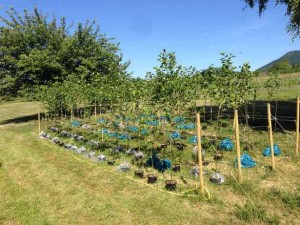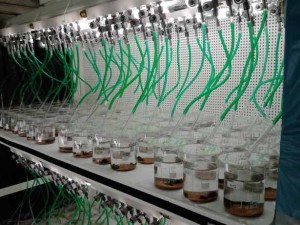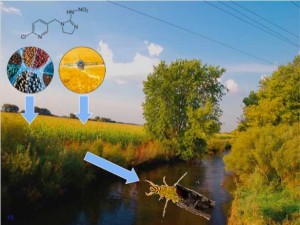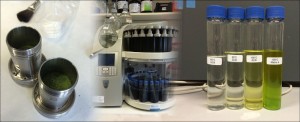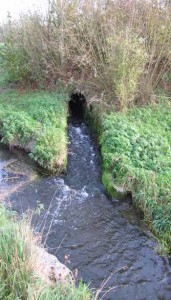In this post, the team Functional Aquatic Ecotoxicology announces five thesis topics.
The team Functional Aquatic Ecotoxicology aims at assessing and understanding structural (amongst others biodiversity) and functional alterations in freshwater environments as a result of anthro-pogenic activities. If you are interested to do your thesis in our research group, have a look to the list below or contact us directly!
Do systemic fungicides affect leaf litter breakdown when transferred to aquatic systems within leaves?
Thesis type: bachelor, case study, diploma, master, RPC
Background: Fungicides are often applied adjacent to riparian vegetation. As a consequence, systemic fungicides may distribute within riparian trees and shed leaves that are transferred into streams may contain these fungicides. This project aims to assess the potential consequences of exposure to such leaf material for aquatic leaf-decomposing communities.
Tasks for the student would include: exposing trees, collection of leaf material, performing experiments with microbial and invertebrate decomposers
Start: flexible
Prior knowledge required: no
Supervisor: Jochen Zubrod
What is the relative importance of diet-related effects and waterborne toxicity of fungicides for caddis fly larvae?
Thesis type: diploma, master
Background: Leaf-shredding invertebrates such as caddis fly larvae can be affected by fungicides via two pathways: first, via waterborne exposure and consequent toxicity. Second, fungicides can affect leaf-associated microorganisms, which determine the food-quality for leaf-shredders and thus may result also in diet-related effects in caddis flies. This project aims to assess the importance of these pathways.
Tasks for the student would include: exposing leaves and caddis flies to inorganic and organic fungicides using a well-established experimental design.
Start: flexible
Prior knowledge required: no
Supervisor: Jochen Zubrod
Do systemic insecticides (neonicotinoids) as part of their diet adversely affect aquatic leaf shredding caddisflies larvae?
Thesis type: diploma, master, research project
Background: Neonicotinoid insecticides are – due to their specific and efficient action against the insect nervous system – among the most commonly used insecticides worldwide. Besides their suspected role in the so called “colony collapse disorder” of bees, major concern were raised about harmful effects of neonicotinoids on aquatic communities and the ecological functions they provide (e.g. leaf litter breakdown). This project aims to assess potential consequences for caddisfly larvae feeding on plant material that has previously been treated with neonicotinoid insecticides.
Tasks for the student would include: performing feeding experiments using the caddisfly larvae Sericostoma sp. exposed to neonicotinoid insecticides a) via the water phase, b) via leaf material and c) consequently comparing the results of both exposure routes.
Start: March / April / Mai 2015
Prior knowledge required: no
Supervisor: Dominic Englert
Extraction and quantification of neonicotinoid insecticides within plant material using accelerated solvent extraction complemented by HPLC/MS analysis
Thesis type: bachelor, diploma, master, research project
Background: Neonicotinoid insecticides are – due to their systemic properties and environmental persistence – easily taken up and distributed within plants where they provide an effective defense against insect pests. However, neonicotinoids can travel form agricultural fields to adjacent ecosystems either by traditional routs (e.g. runoff) or via transport of such contaminated leaf material (e.g. following defoliation, harvesting or storms). In order to detect and quantify neonicotinoids in both target (e.g agricultural) and non-target (e.g. trees) plants, development of adequate extraction and analytical procedures are required.
Tasks for the student: development of cost- and time- effective extraction method using accelerated solvent extraction to determine neonicotinoid concentrations in corn and black alder leaves.
Start: flexible
Prior knowledge required: no
Supervisor: Dominic Englert
Does the release of conventionally treated wastewater pose a threat to invertebrate biodiversity in palatine streams?
Thesis type: diploma, master, research project
Background: Many chemicals of anthropogenic origin are only partly retained or degraded by conventional wastewater treatment plants and consequently released into aquatic stream ecosystems. The structure of aquatic communities as well as associated ecosystem functions might suffer as a result of this constant exposure to chemical stressors.
Tasks for the student would include: taxonomic identification of invertebrate samples taken upstream and downstream of several wastewater treatment plants in the palatinate region. Comparing results for differences in biodiversity between upstream and downstream sites.
Start: flexible
Prior knowledge required: no
Supervisor: Dominic Englert
Interested? Contact us via email or come and visit us in building CI (blue) room 001 (basement, to the right)!
Mirco Bundschuh: mirco.bundschuh@slu.se
Dominic Englert: englert@uni-landau.de
Jochen Zubrod: zubrod@uni-landau.de

